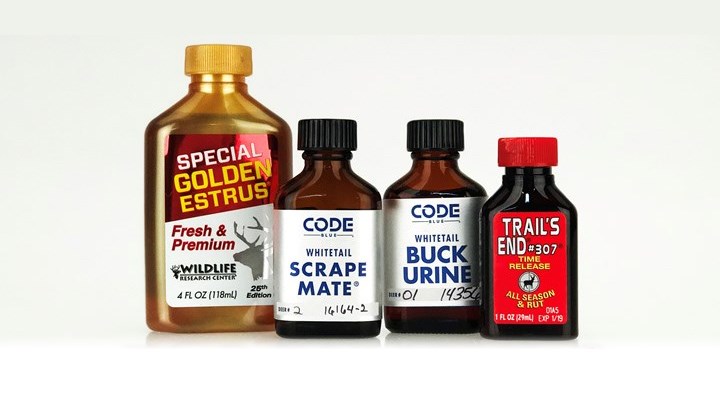
by Cody McLaughlin - Monday, June 14, 2021

Hunters planning to pursue whitetail deer in New Jersey will face new regulations this fall after a controversial new ban on urine-based deer attractants took effect May 10 in what was described as an effort to stem the spread of Chronic Wasting Disease (CWD).
CWD is a prion disease that affects ungulate populations across North America as well as some populations as far as Europe and even North Korea. It is a transmissible neurological disease characterized by structurally abnormal proteins that produce small lesions in the brains of infected animals, which can take up to a year to develop symptoms, including drastic weight loss, stumbling and lack of coordination, listlessness, excessive thirst, drooling, drooping ears and other neurological symptoms. The disease is spread through contamination of the environment by the proteins of affected animals through urine, feces and other bodily fluids.
According to the Centers For Disease Control, CWD was first discovered in Colorado in the late 1960s in captive deer and identified in wild deer for the first time in 1981. By the early 1990s, the prion disease had spread as far as southern Wyoming. Since 2000, CWD has been documented in at least 25 states, inching slowly more eastward, to include cases in New York and Pennsylvania. To date there have been no known cases in New Jersey.
While there currently are no known human transmissions of CWD, since 1997 the World Health Organization has recommended keeping agents of all known prion diseases from entering the human food chain.
Examining the Science
In 2017, wildlife biologist and hunting TV host Larry Weishuhn shared research and advice about the CWD epidemic with readers of this NRA Hunters’ Leadership Forum (HLF) website. Weishun explored the latest science with regard to the disease, including a study of urine-based attractants, and information on the Archery Trade Association’s Deer Protection Program protocols and the steps that manufacturers of urine-based deer attractants can follow to earn its “Seal of Participation” logo on their product packaging. To learn more, click here.
Local Leaders React
Former New Jersey Division of Fish and Wildlife (NJDFW) Director and New Jersey Outdoor Alliance trustee Larry Herrighty recently described the issue to the NRA HLF, explaining there is no way to test for prions in urine, though as a bodily fluid it is a probability that infected deer are passing prions in their urine.
“Although some deer farms have entered the CWD Free certification program initiated by the U.S. Department of Agriculture, most state wildlife agencies do not view this as a fail-safe method of preventing CWD from getting into captive herds. History has shown in states from Texas to Pennsylvania that CWD-free certified herds have come down with CWD.”
Before he retired, Herrighty instructed staff to purchase synthetic deer lures and passed out samples to sportsmen attending the monthly meeting of the New Jersey State Federation of Sportsmen’s Clubs. Several members, as well as I, demonstrated on trail-cameras that bucks were attracted to these scents.
“So out of an abundance of caution to protect our New Jersey deer population, and because substitute effective products are available, the NJDFW recommended to the New Jersey Fish and Game Council that urine-based lures be banned,” said Herrighty. “The council recently adopted this regulation as well as banning the importation of whole deer carcasses taken by hunters out of state. We join many states adopting the same precautions.”
A statement on the NJDFW website now states, “A change in state hunting regulations banning the possession, sale, and use of all natural, deer-derived hunting lures (urine and glandular secretions) becomes effective May 10, 2021. The ban is to help safeguard the health of New Jersey's deer herd from the threat of CWD. These scents and lures are derived from captive deer where the risk of CWD is greatest. The production of deer urine is not regulated; there is no federal or state agency that can certify deer urine-based products as CWD-free, and no level of exposure is acceptable.” The website explains that the division is doing everything in its power to prevent CWD from entering New Jersey and to protect the long-term health of the state’s deer herd and our deer hunting heritage.
New Jersey is also home to several independent lure- and scent-making businesses. Steve Ciasullo of Signal 11 Lures LLC says the deer-lure industry has implemented many measures to make certain that all herds and products are controlled and tested to make certain all urines that leave the farms are free from CWD. “The chance of spreading CWD from a few ounces of previously tested deer lure sprayed from a bottle onto a scent wick is zero,” explained Ciasullo. “The ban is non-science-based and does damage to our sport and the local sports shop businesses.”
As people continue to debate the issue, the bottom line is that hunters in New Jersey and every other state must make sure they are aware of any impending CWD-related regulatory changes in the states they plan to hunt this fall. As of now, 17 other states and Canadian provinces, including nearby Pennsylvania, already ban the natural lures.
About the Author
Cody McLaughlin is a conservationist advocate on public policy issues including hunting, fishing, gun rights, free-market tax and wage policy and the environment. He works as a GOP consultant for conservative political causes, managing clients’ digital communications and online presence and as a trustee of the New Jersey Outdoor Alliance, helping to represent the state’s 1.2 million sportsmen in the political arena.
E-mail your comments/questions about this site to:
[email protected]
